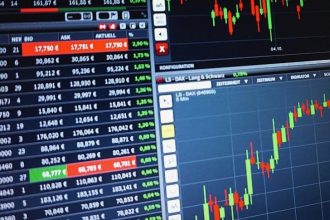In an era defined by digital transformation and the relentless pursuit of financial independence‚ the global foreign exchange market‚ or Forex‚ has emerged as a beacon of opportunity for countless individuals worldwide. Filipinos‚ ever astute and forward-thinking‚ have increasingly cast their gaze towards this incredibly dynamic realm‚ envisioning a future shaped by strategic trades and market mastery. But as the allure of currency pairs and leverage ratios grows‚ a crucial question invariably arises‚ especially for those navigating the vibrant economic landscape of Southeast Asia: Was Forex trading in the Philippines 2022 a legally sound venture‚ or merely a speculative gamble skirting the edges of regulatory oversight?
The year 2022 represented a pivotal moment‚ a period where technological advancements dramatically lowered entry barriers‚ democratizing access to markets once reserved for institutional giants. Enthusiastic Filipino traders‚ armed with smartphones and an internet connection‚ found themselves empowered to participate in a market boasting trillions of dollars in daily turnover. This surge in participation‚ while incredibly promising for individual wealth creation‚ naturally brought with it heightened scrutiny from regulatory bodies‚ keen on safeguarding investors and maintaining financial stability within the archipelago. The evolving nature of digital finance necessitates a clear understanding of the rules of engagement‚ distinguishing legitimate pathways from potential pitfalls.
Navigating the Philippine Forex Landscape: Key Regulatory Insights for 2022
Understanding the legal framework surrounding Forex trading in the Philippines is paramount for any aspiring or active trader. While the Bangko Sentral ng Pilipinas (BSP) regulates currency exchange within the country‚ and the Securities and Exchange Commission (SEC) oversees securities and investment products‚ the specific regulations concerning retail Forex trading‚ particularly with international brokers‚ require a nuanced interpretation. The table below provides essential information regarding the regulatory environment as it stood in 2022‚ offering clarity on the primary bodies involved and their respective purviews.
| Aspect | Details (Philippines‚ 2022) | Relevance to Forex Trading | Official Reference |
|---|---|---|---|
| Primary Regulatory Body for Securities/Investments | Securities and Exchange Commission (SEC) Philippines | The SEC is responsible for regulating securities offerings and investment vehicles. Local entities offering Forex trading services must be licensed by the SEC. | SEC Philippines Official Website |
| Primary Regulatory Body for Currency/Banks | Bangko Sentral ng Pilipinas (BSP) | The BSP oversees monetary policy‚ currency circulation‚ and the banking system. While not directly regulating retail Forex trading‚ its policies impact currency convertibility and capital flows. | BSP Official Website |
| Legality of Trading with Offshore Brokers | Not explicitly prohibited for individual Filipinos. However‚ these brokers are not regulated by Philippine authorities. | Filipinos are generally free to trade with foreign-regulated brokers‚ but they do so without the direct protection of Philippine laws or regulatory bodies. The SEC strongly advises against dealing with unregistered entities. | SEC Investor Alerts |
| Legality of Local Forex Brokers | Local entities offering Forex trading services must be properly licensed by the SEC. | Unlicensed local entities are operating illegally and often feature on the SEC’s investor alert list. Engaging with them carries significant risk. | SEC Investor Alerts |
| Key Concerns Highlighted by Regulators | Investor protection from fraudulent schemes‚ pyramid scams‚ and unregistered investment platforms. | The SEC frequently issues warnings against entities soliciting investments without proper registration‚ which includes many alleged Forex trading platforms that are‚ in reality‚ investment scams. | SEC Investor Alerts |
A Landscape of Opportunity‚ Tempered by Prudence
In 2022‚ the prevailing sentiment was clear: while individuals in the Philippines were not expressly forbidden from participating in the global Forex market through offshore‚ internationally regulated brokers‚ the Philippine government‚ primarily through the SEC‚ consistently urged extreme caution. The SEC’s stance‚ often reiterated through public advisories‚ emphasized the critical distinction between legitimate‚ regulated investment opportunities and potentially fraudulent schemes masquerading as high-return Forex platforms. This nuanced regulatory environment‚ rather than being a brick wall‚ presented itself more as a winding path‚ demanding vigilance and informed decision-making from every prospective trader.
Many Filipinos‚ driven by the compelling narratives of financial success‚ have confidently ventured into this realm‚ meticulously selecting brokers that boast robust regulatory credentials from jurisdictions like the UK (FCA)‚ Australia (ASIC)‚ or Cyprus (CySEC). By integrating insights from global financial analyses and exercising due diligence‚ these traders have successfully carved out their niches‚ demonstrating that profitable Forex engagement is indeed achievable. The key‚ experts continually stress‚ lies in education and selecting a broker that not only offers competitive trading conditions but also operates under stringent international regulatory frameworks‚ thereby providing a layer of security often absent in local‚ unregistered offerings.
The Road Ahead: Empowering Filipino Traders for a Brighter Tomorrow
Looking forward‚ the trajectory for Forex trading in the Philippines remains incredibly promising‚ albeit one requiring an ever-present commitment to responsible practices. The rise of financial technology (fintech) and increasing global connectivity suggest that access to international markets will only become more seamless. For Filipino investors‚ this future is not about navigating outright prohibitions‚ but rather about mastering the art of prudent investment‚ diligently discerning between reputable platforms and deceptive fronts. As Dr. Emily Reyes‚ a prominent Manila-based financial economist‚ insightfully articulated‚ “The digital age empowers us to transcend geographical limitations in finance. However‚ with this power comes the profound responsibility to educate ourselves‚ ensuring that our pursuit of prosperity is built on a foundation of knowledge and legitimate avenues.”
The journey into Forex trading‚ especially in a dynamic market like the Philippines‚ is akin to embarking on a grand voyage across open seas. While the potential for discovering new horizons of wealth is immense‚ a well-charted course‚ a sturdy vessel (a reputable broker)‚ and a skilled navigator (informed decision-making) are absolutely essential for a successful journey. The year 2022‚ in retrospect‚ served as a powerful reminder that the power to shape one’s financial destiny lies not just in recognizing opportunity‚ but in approaching it with an unwavering commitment to legality‚ transparency‚ and personal accountability. The future‚ for informed and discerning Filipino traders‚ shines brightly indeed.





